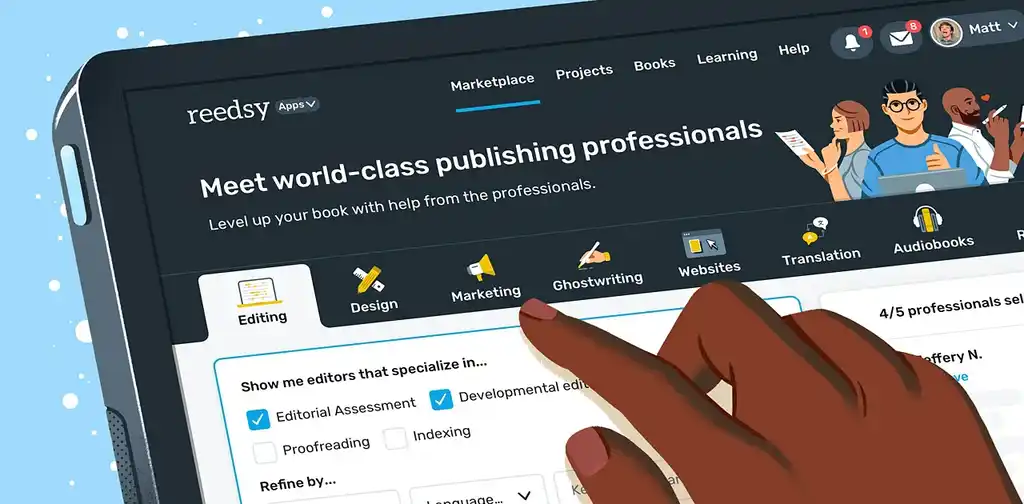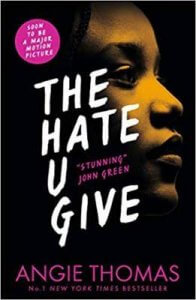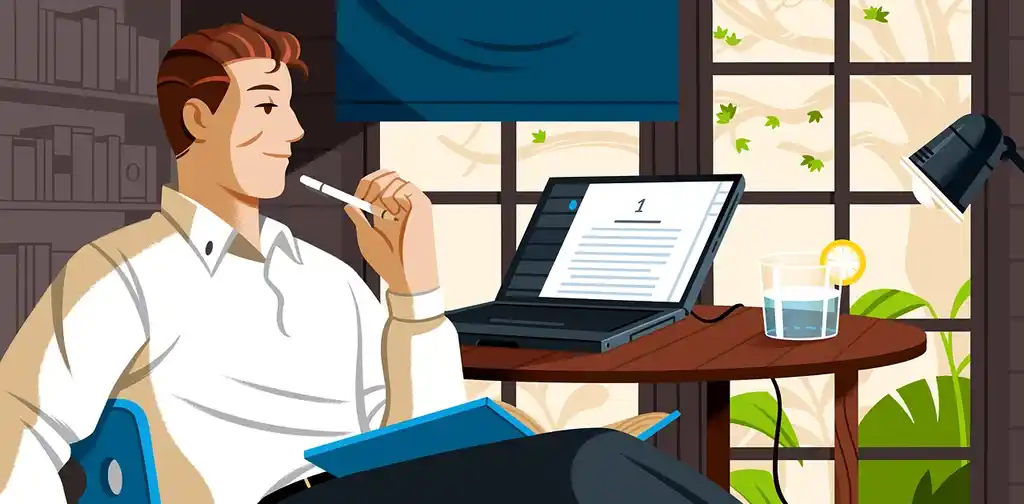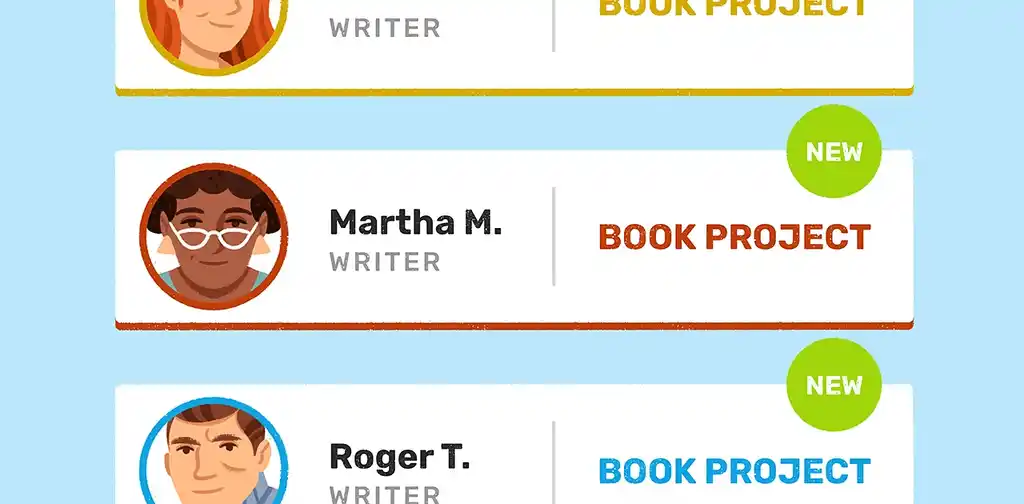Blog •
Posted on Oct 15, 2018
How to Become a Better Editor with Julie Tibbott
About the author
Reedsy's editorial team is a diverse group of industry experts devoted to helping authors write and publish beautiful books.
More about the Reedsy Editorial Team →Ricardo Fayet
Reedsy co-founder and Chief Marketing Officer, Ricardo Fayet has worked with hundreds of authors on their launches and marketing campaigns. He is the author of two bestselling guides on marketing for authors, and a regular presenter at the largest writers' conferences.
View profile →A New York City-based freelance editor and writer Julie Tibbott tells us how she stays on top of her editing game. After spending 13 years as a Senior Editor at a top publishing house, she is now a full-time freelancer who works with self-published authors.
1. Hello Julie. Tell us a little about who you are and what you do.
I’m Julie Tibbott, an editor, and writer with over 15 years of experience in the publishing business. Most recently I’ve worked as a senior editor at Houghton Mifflin Harcourt Books for Young Readers.
I am now delighting in life as a freelance editor of fiction and nonfiction for all ages, with a special affinity for speculative fiction, fantasy, historical fiction, and pop culture-focused nonfiction.
2. How did you start your editing career?
I was an English major in college, and I’d always known my goal was to work with books, reading, and writing in some capacity. The summer after my junior year, I looked for internships at book publishers in New York City and found one at a small independent publisher called Barefoot Books.
It was a wonderful place to begin my career, and not just because they published beautifully crafted books! Being in a small office, with only about ten employees at the time, I was basically everyone’s assistant — this exposed me to many sides of the business, from editorial to sales to marketing and publicity. And like all interns, I spent a lot of quality time digging through the slush pile, which was a great intro to editing!
I worked at Barefoot throughout my senior year of college, and after they moved their office to Boston, I ended up accepting a job in Scholastic’s Book Clubs division, selecting titles for their teen book club. A few years later, I moved on to Harcourt (which later became Houghton Mifflin Harcourt) and remained there for thirteen years.
3. What motivated you to become a freelancer?
To be honest, a layoff! Mergers and restructuring are common in the publishing business, and I managed to weather a few of them over the years, with my job intact. But last spring I was let go from HMH, along with many other staff members.
Although I enjoyed my job there as a senior editor, I was ready for a new opportunity and new challenges, so I welcomed the change. I had already been doing some freelance editing on the side, so I just transitioned into doing it full time.

JOIN OUR NETWORK
Supercharge your freelance career
Find projects, set your own rates, and get free resources for growing your business.
4. How do you keep your skills up? Do you have any go-to resources for editors?
For me, I read and I work. I’ve always got my “editor’s hat” on, whether I’m taking in an exhibit at a museum or reading advertising signage. I consider presentation, efficiency, and economy of language in all scenarios. I attempt to expose myself to a range of opinions and ideas, and I always try to see the story in my surroundings.
Q: What has helped you develop your editing skills the most throughout your career?
Suggested answer
Following expert advice; quality training; having a variety of clients across genres; being part of a supportive network of professionals who do a good job to help stories reach their readers
Alex is available to hire on Reedsy ⏺
As for resources, I know some editors who have taken copyediting classes, but personally, I just learned by reviewing professionally copyedited materials. There's a list of proofreaders' marks in the Chicago Manual of Style that I used to refer to a lot in the early days, but eventually, I caught on! Occasionally I'll still look at the Chicago Manual, and other than that, maybe Strunk & White's The Elements of Style.
Creative writing classes and critique groups can also be helpful resources — you get to see how people respond to a variety of work, get a sense of the most effective ways to offer criticism, and learn how to polish prose. Honestly, I loved taking expository writing too, even though many more creative writers hated that class! The bottom line is that structure, clarity, and logic are always important, no matter what kind of writing you're doing.
Q: How do you stay updated on current trends in publishing?
Suggested answer
Like any other profession, editing has its own membership organizations, publications, and conferences. I joined the Editorial Freelancers Association, Nonfiction Authors Association, and others so I can participate in the online chats and attend conferences such as Women in Publishing. Reedsy has a robust library of webinars, and don't miss their live webinars on cover critique, editing, and marketing. I read new books by industry thought leaders (notably Ricardo Fayet, Penny Sansevieri, and the University of Chicago). I attend conferences (IBPA among others). And I often take classes to sharpen my skills. Consider the NFAA's courses on publishing, marketing, and publicity. Editors need to understand the entire process from conception through writing and production, cover design, and marketing. With so much change and controversy especially around artificial intelligence, we cannot continue to do the same things without innovation and integration.
Sandra is available to hire on Reedsy ⏺
5. In your opinion, what skills are the most important for book editors?
In my view, the most important skills for an editor are taste (though that’s subjective, of course), attention to detail, curiosity, empathy, a sense of play, and the ability to make connections between a story you love and broader social/cultural movements. You need to stay informed about what social and cultural movements are happening in the world, and then be able to see how a story on your desk could appeal to culturally savvy readers.
A good example of this would be the YA novel (and soon-to-be movie) The Hate U Give by Angie Thomas. At the time that manuscript was being shopped around, the US news was inundated with stories about police officers shooting unarmed black men and boys, and activists were taking a stand against these injustices. So there was great demand for a story that touched on those timely and important themes.

Of course, not every book that relates to current events or popular culture is going to be a bestseller. But being able to make those connections, as both an author and editor, can give the story a bit more traction and help it find its audience.
6. What has changed the most about your editing process since you first started? What have you learned to focus on?
The thing that’s changed most in my process is a greater sense of clarity in prose, which comes from a lot of experience making and reviewing line and copy edits. This process really varies from one piece of writing to the next, but here are some of the elements I often see muddling prose:
- Prepositional phrases. Not that you can get away from using them completely, of course, but I often find sentences that are much clearer without prepositional phrases at the beginning or end.
- Directional words/phrases. While it’s sometimes important to know whether a character is looking or going east/west, left/right, up/down, etc., it can be dizzying and repetitive when indicated too often.
- “Looking/seeing” words. Again, you don’t want to eliminate these entirely, but I often see them overused, particularly in first person narratives. When the reader is already looking through the eyes of the narrator, it's not necessary to describe the play-by-play movement of what they see — it's enough to simply describe the scene before them. So a sentence like "In the distance, she could see the sun setting," could simply be "In the distance, the sun was setting."
- Run-on sentences. If you've got to reread that six-line sentence multiple times to grasp its meaning, then it's probably too long and rambling.
- Adverb overload. Not every sentence or dialogue tag needs one adverb, let alone multiple instances of them. I find they are best used sparingly.
Of course, style and voice also come into play when I'm deciding what to cut, so none of these are hard-and-fast "rules". But generally, any device that's used excessively is going to stand out and is worth considering cutting or changing.
7. What does your editing process look like?
My process begins with reading a hard copy of the manuscript, editing the text, and making any notes that occur to me as I go along. When that’s finished, I sit down to key in the edits on an electronic copy of the manuscript — which basically means reading the manuscript again. At this time, having a better sense of the full scope of the story, I reconsider some of my edits and notes and only include the ones that are most applicable.
At the same time as I key in these edits, I create a document to record notes and passages from the manuscript, which will be transformed into an editorial memo for the author. Keying in the edits usually takes at least a couple of days, and the memo (usually 5-7 pages) takes me a full day to craft. I’ll often then have a follow-up phone call or messages with clients later on, after they are finished reviewing my edits and notes. This is when we analyze problem spots in more detail and discuss next steps.
8. When deciding whether to take on a project, what do you look at?
I try to only work on stories/writing I actually enjoy reading, because I think you need to have some affection or affinity for the work in order to provide valuable feedback. Generally, I will not edit work by children — but not because I don’t think kids can be great writers! Having reviewed work by many young writers, I believe their time and resources are better spent simply writing, reading, and learning during those formative years. Chances are, if they stick with it, they’ll gain a lot more from a professional edit sometime in the future.
Q: How do you decide which projects to take on?
Suggested answer
I look for projects where I can see an excellent, collaborative relationship developing with the writer, and where I'm genuinely curious about the subject they're writing on.
When I look at the initial brief and start to chat with a writer, big green flags include:
- A writer whose sample is clearly ready for the type of editing they're requesting. If they've asked for proofreading when the book clearly needs a line edit first, I steer clear.
- A writer who understands what the book still needs and the gaps they can't fill on their own. If they're not going to be open to feedback or they're getting proofreading to jump through a hoop, I'd reconsider the project. A sample edit is a good test here.
- A writer who can appreciate the number of hours that go into editing and has a budget that can give me the time to do a great job. I like to focus on one book at a time and I like to feel like I'm really bringing something to the table, so requests to rush jobs or cut corners are a big "no" from me.
Because I work with a lot of memoirs, another major consideration is professional distance. If I can see that the writer's experience is too close to my own, I send a heartfelt message asking them to look for another editor, I don't want to be working on someone else's story while my own experience is rising to the surface. If their project sounded incredible, I'll make a note to buy it when it's released and enjoy it as a reader instead.
Mairi is available to hire on Reedsy ⏺
9. Do you have any strategies or tricks you use to improve your editing process?
I find reading poetry is a good way to reset after working with prose, and to get a sense of rhythm and impressionistic description, which can really benefit the editing process. Listening to music and writing songs can also provide this sort of insight. Honestly, what teaches and informs my editing process the most is simply absorbing a wide range of art, and really thinking over and discussing how and why it’s done the way it is.
10. What are some techniques you find useful when editing?
Sometimes I’ll read dialogue or certain other passages out loud to see if it sounds natural. One of my heroes is Twilight Zone writer/creator Rod Serling, who said, “Every writer is a frustrated actor who recites his lines in the hidden auditorium of his skull.” And I do believe that keeping the audience in mind is critical, so this resonates with me.
Also, when I notice a lot of repetition of certain words or phrases in a manuscript, I’ll highlight them and change or eliminate them in the edit, to ensure that there’s enough variation in the language.
11. Do you stick to a reading diet?
I have no strict “reading diet,” though I will admit to reading too little recent fiction simply because I spend so much time reading for work. I tend to read a lot of long-form nonfiction stories (from the New Yorker, Harper’s, etc.) because of those time constraints.
12. How do you deal with clients who see your feedback as harsh criticism and have a hard time accepting it?
The way I see it, authors are seeking me out expressly for my criticism and expertise. They aren’t paying to be coddled. I try not to be harsh or unkind, but I always try to be honest, and to tell them what I appreciate about their writing as well as what is not working, in my opinion.
Something I stress to authors is that a big part of my job is just asking questions — the same questions that will likely occur to other readers of their work. And in the end, edits are always suggestions: it’s up to the author whether or not they agree to my suggested edits, or handle it some other way. It is their work, after all.
I prefer to work with authors who have a professional attitude about the process. It can be tough not to take criticism of one’s writing too personally, but I think many authors realize that a different perspective on their story can bring growth and improvement. And if they’re hoping to become a better writer, that’s exactly what they want!
Q: How do you balance being critical while encouraging authors through your feedback?
Suggested answer
I wouldn't use the word 'critical'. In copyediting it's more about assessing how the author's words are communicating their intention without ambiguity or potential missteps. It's not my book, the author has the last say. If something doesn't read smoothly, I'd suggest an alternative way of phrasing it so it's clearer or wouldn't jar with readers. We wouldn't want readers to have to go back and reread a sentence and lose the thread of the narrative. With my suggestions, I try to reflect the author's voice, so use suitable language to fit the existing text – still, the author is free to ignore any of my ideas, of course!
Alex is available to hire on Reedsy ⏺
This issue can prove to be a real tightrope walk even for the most experienced editor. You should always keep in mind as an editor is that your goal is to be constructive, not destructive. I always try and balance out my editorial comments: although I'm always as open and honest as possible in my critique of an author's work, I always take care to emphasize the stronger aspects of their writing as much as the areas that need improvement. The trick is to inspire the author to improve their work--not to discourage them. I find that most authors appreciate criticism of their work when its dispensed in tough-but-fair language and is genuinely tailored to help them become better writers.
Michael is available to hire on Reedsy ⏺
Writing is an enormously personal endeavor where the writer nevertheless must expose his or her work to outside scrutiny. It’s a vulnerable moment, where hundreds or even thousands of hours of solitary effort is suddenly exposed to the light, and receiving the wrong sort of feedback can be destructive to a writer’s confidence. It’s natural for empathetic beta readers or editors to want to protect the feelings of writers, perhaps even glossing over flaws so as not to cause harm and potentially even end the career of an aspiring writer before it has begun.
I think this is a natural tendency, but when I represent a new author as an agent I need to put the best possible work in front of editors if I’m going to have a chance of landing a contract. Similarly, aspiring writers who approach me on Reedsy are entering an extremely competitive field, on the same order of difficulty as trying to break in as a professional athlete, actor, or musician, and they’re also paying good money to receive a professional opinion, which takes time and effort, and can be expensive. My job is to identify weaknesses and how to fix them. I cannot hold back from criticism because I want to spare a writer’s feelings.
My goal, then, is to give credit where credit is due, giving compliments as merited, but also to find those areas where the writer is falling short and providing a pathway to strengthen the novel in question and give it a better chance of success. I’m also hoping not just to improve this novel, but to give writers techniques that will help improve future work as well. I want to take the areas where they are already good and make them great, and turn those areas of weakness into strengths. If I can do that, and leave writers encouraged and optimistic about the very real work that lies ahead, then I feel like I have done my best work and provided good value.
Michael is available to hire on Reedsy ⏺
Want to discover more interviews with publishing professionals? Head to the Reedsy Freelancer Blog.

FREE RESOURCE
The Full-Time Freelancer's Checklist
Get our guide to financial and logistical planning. Then, claim your independence.
Reviewed by Linnea Gradin
The editor-in-chief of the Reedsy Freelancer blog, Linnea is a writer and marketer with a degree from the University of Cambridge. Her focus is to provide aspiring editors and book designers with the resources to further their careers.
As the editor of Reedsy’s freelancer blog and a writer on the Reedsy team, Linnea has her hand in a bit of everything, from writing about writing, publishing, and self-publishing, to curating expert content for freelancing professionals. Working together with some of the top talent in the industry, she organizes insightful webinars, and develops resources to make publishing more accessible to writers and (aspiring) publishing professionals alike. When she’s not reading, she can be found dribbling on the football pitch, dabbling in foreign languages, or exploring the local cuisine of whatever country she happens to be in at the time.

